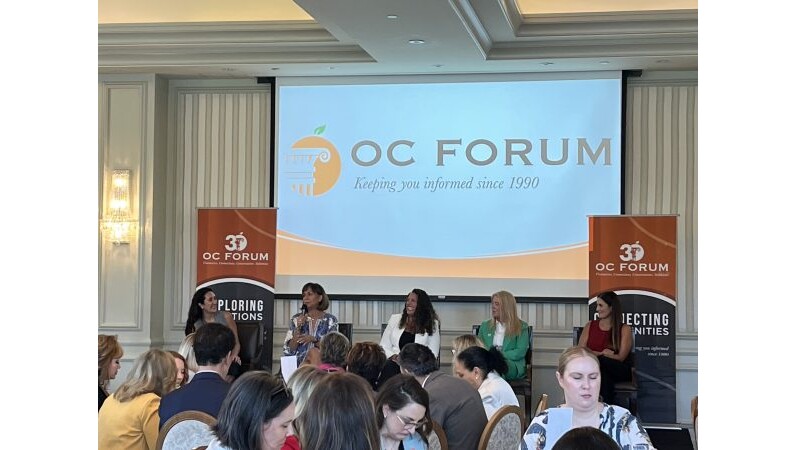In response to bruising funding cuts and freezes, Orange County nonprofit leaders said they’re considering radical changes to the way they approach financing, resource sharing and collaboration to continue serving their communities.
“This is a pivotal moment for us,” Claudia Bonilla Keller, the CEO of Second Harvest Food Bank, said to local nonprofit representatives and other attendees at an OC Forum panel on Thursday, Aug. 21 at the Pacific Club in Newport Beach.
Keller, whose organization provides food to nearly 300 community institutions, said the slashed funding has pushed the food bank to shift gears operationally and figure out how to become more self-sufficient. After years of depending on federal resources during the pandemic, she said nonprofits now need to rally support from local communities to continue operating.
The Trump administration’s sweeping cuts could worsen staffing shortages and funding access issues, which are among the greatest challenges that the county’s nonprofits face, according to a March survey of more than 600 nonprofits conducted by the Samueli Foundation and the Orange County Community Foundation. The Samueli Foundation invested $15 million to address those needs.
Keller said Second Harvest Food Bank has been struggling with staffing issues, as the pay and benefits nonprofits offer cannot compete with businesses in the for-profit sector.
Jennifer Friend, a panelist and CEO of Project Hope Alliance, stressed the need for more regular communication among nonprofits so that they can more efficiently provide services to community members.
She pointed out the dearth in teen mental health services despite rising need — and yet, a UC Irvine mental health program couldn’t recruit enough youth patients.
Friend, whose organization supports children experiencing homelessness, also highlighted opportunities for nonprofits to partner with for-profit entities on workforce development issues. Nonprofits that work with youths, for example, can function as an employment pipeline for businesses struggling with recruitment and retention, she said.
“Our workforce wants the kids that nonprofits are supporting,” Friend said.
Bonni Pomush, the CEO of the workforce readiness nonprofit Working Wardrobes, said nonprofits can help businesses understand employment barriers people face and guide them to modify their recruitment strategies.
One nonprofit leader in the audience, Veterans Legal Institute co-founder Antoinette Naddour, suggested establishing a system by which organizations can seek support or partnership opportunities — an efficient way of “shooting out the bat signal,” she said.
Panelist Madelynn Hirneise, who leads the organization Families Forward, said it’s crucial for nonprofits, in this moment of crisis, to reframe the “scarcity mindset” to one of innovative collaboration. As resources dwindle, she said, it’s important to share knowledge and information with one another.
Hirneise said limited grant money might encourage more nonprofits to explore mergers and acquisitions. Others might look into ways to reduce supply costs, she said.
Amid the funding challenges, she urged young people to bring their skills in AI and technology to help grow the nonprofit sector.
“Nonprofits are more than just a career path,” Hirneise said. “We need you.”
